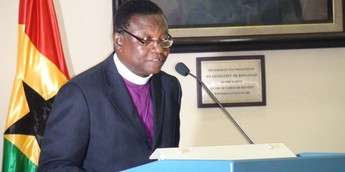In the lead-up to Ghana’s December 2024 elections, former chairman of the National Peace Council (NPC) Rev. Prof. Emmanuel Asante, has voiced concerns about maintaining peace, transparency, and moral accountability within the election process.
Rev. Asante emphasized that peaceful elections are not only a legal but also a moral responsibility, particularly when political leaders publicly commit to non-violence.
Rev. Asante expressed his views on a contentious issue of deploying military personnel to polling stations, an action that has sparked debate following statements on the issue by John Dramani Mahama, flagbearer of the opposition National Democratic Congress (NDC).
John Mahama had called for an end to military presence at polling and coalition centers, describing it as a “recipe for chaos.”
Rev. Asante also addressed the moral dimensions of peace commitments, following a recent peace campaign organized by religious leaders, including the Ghana Pentecostal and Charismatic Council and the Christian Council.
Although the NDC had initially been hesitant to sign a peace pact, its leaders, along with those of other parties, publicly committed to peaceful conduct in the upcoming elections.
The former NPC chairman emphasized that these public declarations, though not legally binding, hold moral weight.
He urged politicians to uphold their promises, reminding them that “the public would know the type of person you are” if they failed to adhere to their peace commitments. He also pointed out that the responsibility of moral integrity lies within each leader, asserting, “Your conscience, you would have to deal with your conscience.”
Rev. Asante underscored the need for transparency and cooperation between the Electoral Commission (EC) and political parties., noting that the EC has generally been open and communicative, but cautioned against decisions that could create suspicion or erode trust.
“If they are going to introduce anything new, it would be good to get a buy-in of the various political parties [and] discuss with them, why it is necessary for such a thing to be done. They should not do anything to create suspicion.
Rev. Asante also addressed specific challenges in areas prone to violence, such as Bawku, where conflict has historically flared around election times, emphasizing that the presence of security forces, including the military, may be necessary to maintain peace in such regions.
Drawing on his experience as the former chair of the National Peace Council, he highlighted the need for a balanced approach.
underscoring that peace can only be discussed meaningfully when safety is assured. In his view, “peace people come in” to mediate, but only after security forces have stabilized conflict zones.
Rev. Asante reflected on the broader responsibilities of leaders and the moral weight of their promises.
As Ghana approaches a critical election, he reiterated the importance of integrity and transparency, urging leaders to act in ways that inspire trust and peace.
He called on all parties to respect their public commitments, underscoring that in the absence of legal enforcement, moral integrity remains crucial.
By Leo Nelson || Ghananewsonline.com.gh

